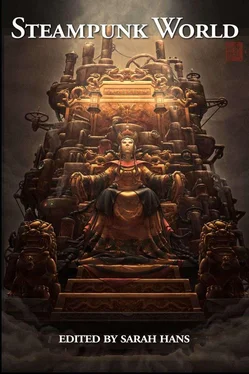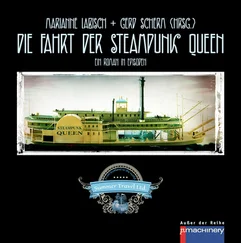When he got to the jetty clan’s office on dry land, he found the money-counter writing out the assignments of the day. “Lee-phek?”
“Ah Heong?” Lee raised a very hairy and peppery eyebrow. He was much older than everyone else on the mixed clan jetty, had lived there the longest, so was the de facto patriarch. “What is it?”
“What’s my assignment today?” Heong asked, anxious to work. He could feel a lot more normal while working.
Lee’s eyebrows came together to form a caterpillar. “Aren’t you supposed to go for your check-up today?”
Heong had forgotten. On purpose. The doctor, inventor and scientist that had moved to Binlang a year ago had become his benefactor by way of a tragedy. “Ah-"
Lee was already shaking his head. “The sin-sang Keling was very clear to me that you were to have every fourth day off so you can go see him and get a check-up. Have you gone?”
“I thought I'd be more useful here.”
“Hai, Heong-chai," Lee said, scratching his head and sighing, “you know I could use every man I can get, especially you! Your strength is so amazing these days, so you really help make work easier. But I have my orders to make sure you go in for your check-up.”
“But no one else has to. Why do I have to miss out on paying work when no one else has to?” Heong argued.
“Ah Heong…"
Heong shook his head and raised his hands. “All right, all right, I'll go see him.”
Lee nodded in approval. “Then come right back.”
Heong doubted that there would be work waiting for him; it was the dry season, and the number of ships coming in had dropped significantly. Still, there was a chance he would have something to do when he got back, so he jogged to the doctor’s home.
Heong was strong despite his thin frame, so it was easy for him to beat up the other boys who came to tease and harass him and San Yan for playing together.
Some elder was always keeping an eye on the young ones in the courtyard of the alley they lived in. One day there were two old men playing chess while three more sat on rattan chairs nearby, smoking tobacco. Two old women gossiped on the stone steps in front of their shophouse.
San Yan was pretending to keep house and had asked Heong what he wanted for dinner. Roast pig, he had said, and then said, “I’m going to work now," and 'stepped out of the house' to beat up the closest two boys. When he was done, he 'came home' and she pretended to serve him dinner, three flat, smooth stones on a banana leaf.
The elders were very much amused by this; one of the old women even cackled out loud. San Yan later distributed sweets to everyone and asked the hurt boys how they were. She cleaned their wounds with purple iodine and then all the children decided to play hospital, because one had just opened up a few hours' walk away.
The adults tolerated the violent ramifications of Heong and San Yan’s relationship, provided they did their chores and errands faithfully. But Heong’s parents had higher aspirations for him; they had saved money to send him to learn from the teachers at the foothills of Bukit Cina. There was one old man, a scholar from the motherland, who taught at a pondok in between the capital and the hill they lived on.
Soon, San Yan was tending to fewer and fewer wounds, because she had less and less time with Heong.
“San Yan," a neighbour called from the doorway San Yan had left open to let in more light.
San Yan looked up from her embroidery. “Ha?” She squinted. Although the prism on the roof lit up the room, the sunshine blotted out the features of the neighbour, leaving a silhouette at first. San Yan recognized her as Chai Yee, who lived several doors further out on the jetty.
“San Yan, we're going to the temple to buy joss sticks. Do you want to come?”
San Yan was touched. There were not many women who lived on the jetties—jetty wives were exceptions, rather than the rule. The men who came here to work did not bring their family, and if a man could afford to marry, he also could afford to move away. “Oh, no, I have to finish these shoes for tomorrow’s market!”
“Haiya, your Ah Heong is getting paid so much these days, no need to work so hard!” Chai Yee laughed, knowing that joke didn’t have much bite. Workers were paid pittances most of the time as a result of intense competition between the jetty clans. The Chap Seh Jeo received slightly better pay, mostly because of the towkay soh’s generosity, but it still wasn’t much to get off the jetty without a lot of work.
San Yan pondered Chai Yee’s joke. She and Heong maintained a box of savings under their bed, and she had an inkling that it was getting more and more full each time she looked in, but had never counted. She counted the separate box they kept for household funds.
So she smiled instead. “Ah Heong and I like working. Wouldn’t know what to do if not.”
Chai Yee tsked. “Don’t work so hard!” she scolded before walking off.
San Yan stitched on a few more beads and then set aside her work to stretch. She poured herself a cup of water from the kettle on the stove and went to stand in the doorway, smiling at passing neighbours who were coming home to rest after the morning shift.
Some of them did not smile back. They seemed to push out their shoulders at her—she couldn’t miss the black patches they wore on their sleeves in honour of their dead. Heong wore them too, as did she. She'd sewn them on herself. Did they think she forgot so easily the men who died, most of whom had been frequent visitors to their home for evening games of mahjong? Did they resent her the miracle that kept Heong alive?
Despite the heat of the afternoon, she felt cold inside. If this was how they were shunning her, then how were they treating Heong?
While Heong learned the language of a court far away, San Yan was apprenticed to an embroiderer. He was distantly related to her through a great-uncle of her parents. Heong visited her often, bringing beads from the capital city to mollify her master, who always seemed to be agitated by Heong’s presence.
He had carved their names into a nearby tree. Although she was illiterate, she appreciated the gesture. And although they only saw each other every few days in the evenings when he found time to visit her, he could tell she was unhappy despite learning a skill she was good at. His fingers were stained with ink, and hers were stained with scabs from needlepricks of distraction.
“What’s wrong?” he would ask, and she would shake her head and maybe cry.
One day when he arrived to visit, he found her standing over her master’s limp body on the ground. Her hands were clasped over her mouth, and her sleeves were torn. Heong touched the man’s neck and found him still alive and breathing. San Yan wrung her hands, babbling about how she hadn’t meant it and what was she to do?
So Heong persuaded her to pack some things, while he ran home to grab some clothes, a toolkit, his stationery. They ran away in the dead of the night, caught a boat that they thought would take them to Temasek, but instead brought them to Binlang.
Heong never enjoyed the visits to the doctor. They were for most part brief and perfunctory, and he sensed that the doctor was more interested in his own work than in actually making sure Heong was all right.
The visits also took him deeper inland, through the harbourside town of Tanjung Penaga. Here and there, people built factories, all dark-skinned men, workers brought in by the Keling scientists and doctors like Subramaniam sin-sang. They occasionally stopped to stare at him, some of them nodding in acknowledgement, and he nodded back.
One of them even stopped to make eye contact with Heong, and then thumped his chest. Heong looked away. They spoke amongst themselves, obviously talking about him. The man called after him in what he guessed was Tamil, but he didn’t look back.
Читать дальше












